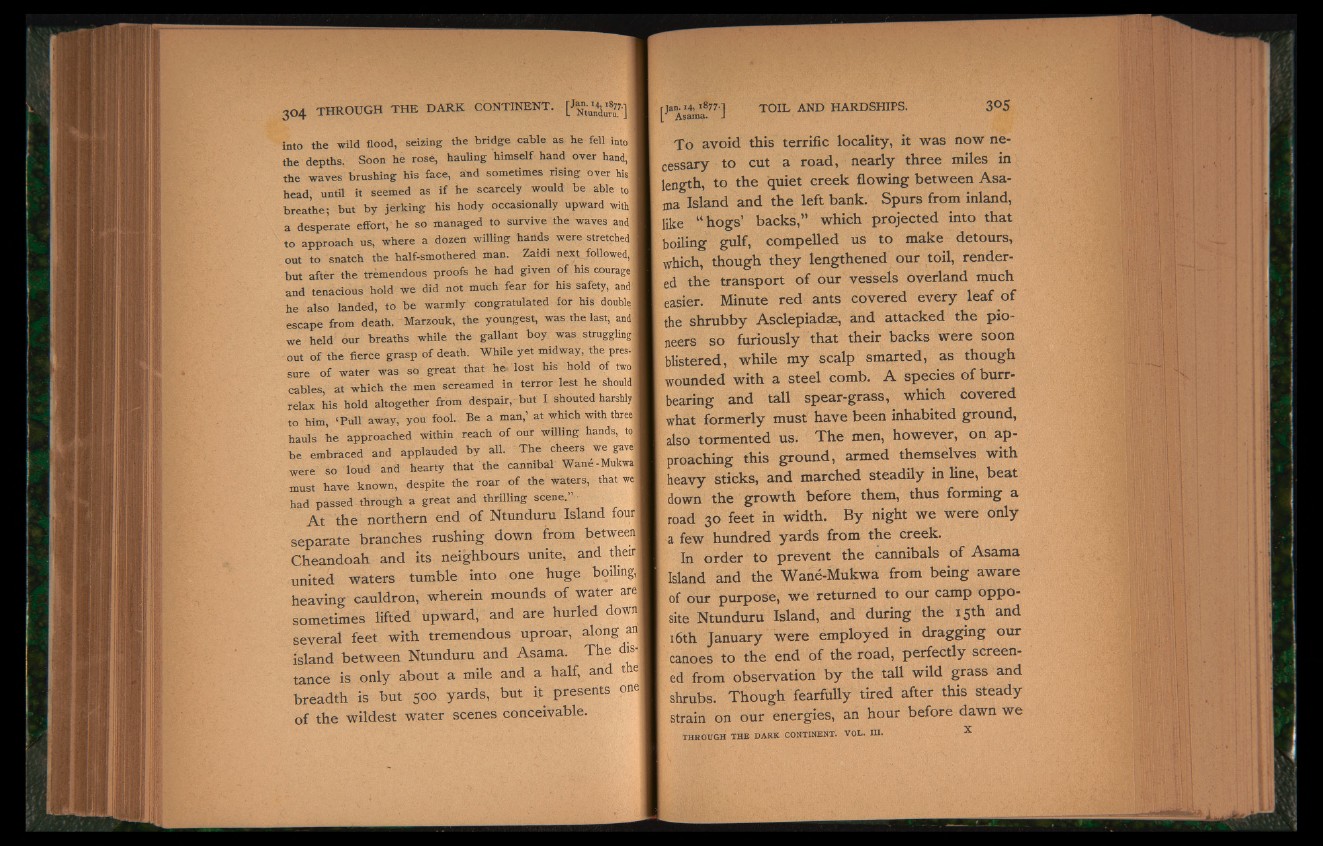
into the wild flood, seizing the bridge cable as he fell into!
the depths. Soon he rose, hauling himself hand over hand, !
the waves brushing his face, hud sometimes rising over his]
head, until it seemed as if he scarcely would be able to]
breathe; but by jerking his hody occasionally upward with]
a desperate effort, he so managed to survive the waves and]
to approach us, where a dozen willing hands were stretched]
out to snatch the half-smothered man. Zaidi next followed,!
but after the tremendous proofs he had given of his courage
and tenacious hold we did not much fear for his safety, and
he also landed, to be warmly congratulated for his double
escape from death. Marzouk, the youngest, was the last, and
we held our breaths while the gallant boy was struggling
out of the fierce grasp of death. While yet midway, the pres]
sure of water was so great that he lost his hold of two
cables, at which the men screamed in terror lest he should]
relax his hold altogether from despair, but I shouted harshly]
to him, ‘Pull away, you fool. Be a man,’ at which with three
hauls he approached within reach of our willing hands, to
be embraced and applauded by all. The cheers we gavel
were so loud and hearty that the cannibal Wane-Mukwal
must have known, despite the roar of the waters, that wel
had passed through a great and thrilling scene.”
At the northern end of Ntunduru Island four!
separate branches rushing down from between]
Cheandoah and its neighbours unite, and theirl
united waters tumble into one huge boiling,!
heaving cauldron, wherein mounds of water are
sometimes lifted upward, and are hurled downj
several feet with tremendous uproar, along an]
island between Ntunduru and Asama. The disj
tance is only about a mile and a half, and t e
breadth is but 500 yards, but if presents one
of the wildest water scenes conceivable.
r Jan. 14, >8771 TOIL AND HARDSHIPS.
[ Asama. J
To avoid this terrific locality, it was now necessary
to cut a road, nearly three miles in
length, to the quiet creek flowing between Asa-
ma Island and the left bank. Spurs from inland,
like “ hogs’ backs,” which projected into that
boiling gulf, compelled us to make detours,
which, though they lengthened our toil, rendered
the transport of our vessels overland much
easier. Minute red ants covered every leaf of
i the shrubby Asclepiadae, and attacked the pio-
| neers so furiously that their backs were soon
blistered, while my scalp smarted, as though
wounded with a steel comb. A species of burr-
bearing and tall spear-grass, which covered
what formerly must have been inhabited ground,
also tormented us. The men, however, on approaching
this ground, armed themselves with
heavy sticks, and marched steadily in line, beat
down the growth before them, thus forming a
road 30 feet in width. By night we were only
a few hundred yards from the creek.
In order to prevent the cannibals of Asama
Island and the Wane-Mukwa from being aware
of our purpose, we returned to our camp opposite
Ntunduru Island, and during the 15th and
16th January were employed in dragging our
canoes to the end of the road, perfectly screened
from observation by the tall wild grass and
shrubs. Though fearfully tired after this steady
strain on our energies, an hour before dawn we
THROUGH THE DARK CONTINENT. VOL. III.